
"Demonstration of four golf shots on Cardigan Golf Course with coast in the background, including the shot repeated but recorded in slow motion. Footage of tennis played at the 1931 Wimbledon Tennis Championships on 29 June 1931: including shots of the 3rd round mixed doubles match between Boussus/ Lycett v Von Cramm/ Aussem; the 3rd round women’s doubles match between Godfree/ Round v Holcroft-Watson/ Michell; the Men’s singles quarter-final between Shields v Austin; the Men’s singles quarter-final between Borotra v Satoh; and the Men’s Doubles 3rd round match between Collins/ Gregory v Cooper/ Greig." (EAFA Database)
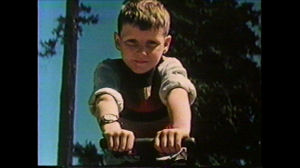
"This film captures (in excellent pre-war Kodachrome) a day in the life of Stanley Park. An early effort at independent documentary production by a group of Vancouver film enthusiasts, including amateur cinematographers Oscar Burritt and Don Lytle. The Coast Films group intended to produce a series of films that could be distributed by the fledgling National Film Board of Canada, but World War II intervened, and this was their sole group effort. Stanley Park was restored in 1987 by the British Columbia Archives." (BC Archives)
"Stanley Park is a languid but lyrical look at flora and fauna, people at play, and the traffic of cars and ships in and around the park. . . . The excerpt shown here [on the AMDB] is the middle third of a 16-minute film [at 24 frames/second]. We see people arriving at the park on a weekend--by streetcar, by car, and on foot. The next sequence shows a very large audience watching a concert performance at Malkin Bowl. (The three young women on stage have probably just finished singing "Three Little Maids from School" from The Mikado.) There's an engaging sequence of children playing on the swings and seesaws; then there's footage of adults playing checkers and tennis, and another large crowd enjoying a cricket match. Scenes along the beach and the seawall (including the Second Beach Pool) lead into shots of boats and steamships sailing near First Narrows, and an ocean liner passing under the recently-completed Lion's Gate Bridge. Charles Marega's handsome Art Deco stone lions, poised at the eastern approach to the bridge, are shown in close-up." -- Seriously Moving Images, July 2025.
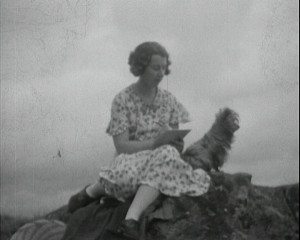
"Amateur filmmaker and cinema historian H.A.V. Bulleid employs rapid montage and a sense of foreboding in this rural tragedy set in the Welsh countryside. On farmland in rural Wales, where crumbling farm buildings reflect the rural desolation, a young lady spends her holidays wandering the fells with her ever reliable dog. When she meets a young farmhand, a romance develops. But as the girl grows closer to the young man, she pays less attention to her dog. And when the dog is left at the farmhouse as the pair goes rock-climbing, tragedy ensues. Sensing a problem, the dog searches the fells as day turns to night. But will he find his master? And will the young lovers survive?" (EAFA Database)
"Filmmaker George Jesse Turner gets alarmingly close to the action as he records the thrills of motor racing on Southport's golden sands, with Tailwagger 1 and other cars hurtling around him. The town became famous not only for racing, as Southport sands also saw land speed record attempts, with the likes of Sir Malcolm Campbell and Sir Henry Segrave drawing huge crowds of spectators." (BFI Player)
"All of the players in this picture were boys in a summer camp who upon discovering that one of their members has a movie camera decide to make a motion picture. Like all youth they decide to imitate and based their story on Tarzan. The producers of this worked up a splendid bit of comedy, interjected a fine piece of melodrama with an Alger Jr. finish that rounded it out into a production that many of the judges felt would have been worthy of showing in any theatre. The acting, direction, story and handling as a whole was considered equal to many a professional comedy." American Cinematographer, Dec. 1932, 7.
"Telemark, filmed in the Swiss Alps by William G. McKelvy, ACL, is, as its name suggests, a skiing picture. However, it is more than that — it is also a very delightful and neatly plotted comedy that is the more convincing for being uncomplicated with the usual subsidiary plot and counter plot. Four or five youths who are expert skiers, one who is a novice, and a girl are at the beginning of a down mountain ski trail. The girl offers a kiss to the boy who can catch her. She tarts off, the able skiers follow hard on her trail, while the beginner stumbles and lags far behind. But the girl decides to trick her pursuers and hides on the way. The ending is obvious. The picture was exquisitely planned and sequenced for, as the camera follows the skiers down the mountain, there is complete smoothness in the shift of viewpoints. The action is made the occasion of splendid studies, as the boys on the run swerve and turn in stems, Christianias and Telemarks. Mr. McKelvy did not neglect to select charming compositions and to take full advantage of clear air and the contrast between the dark figures and trees and the white snow." Movie Makers, Dec. 1933, 500.
"Two popular subjects make up this short amateur film - cricket and aircraft. After scenes of bi-planes, we visit the Ashes 4th Test at Old Trafford in July 1930. After the toss between captains Bill Woodfull and Percy Chapman, the crowd applauds cricketers onto and off the field. This test match fell foul of the Lancashire weather and had to be left drawn, rain stopping all play on the last day." (BFI Player)
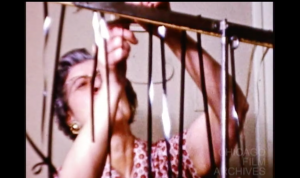
"An amateur film made by and starring the husband and wife duo, John & Evelyn Kibar. The Kibars are on a search for a hobby, and decide upon filmmaking. A domestic mishap by Mrs. Kibar results in their film being edited incorrectly. Title cards displaying dialogue are dispersed throughout the film." Chicago Film Archives
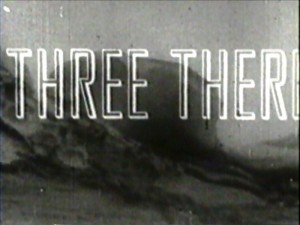
Sub-title: "Galiano Island 1940" Summary: "Impressionistic record of a sojourn on Galiano Island over a Labour Day weekend, with Oscar Burritt, Dorothy Fowler [later Burritt] and Margaret Roberts." (British Columbia Archives)
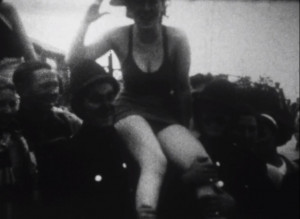
"The excitement of a 1937 holiday starts with the packing of Arthur J. Dawson's initialled suitcase and the train ride from Saltash to Hemsby in Norfolk. Station staff wait to help passengers transfer their luggage to the wooden chalets of Hemsby Holiday Camp. Organised entertainments include following behind a carload of musicians including accordionist, exercising in swimsuits on the beach, silly sports and getting messy with flour and water." (BFI database)
Total Pages: 14